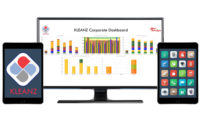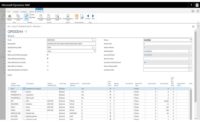In the modern age, traceability is becoming more and more important, both to suppliers and to end users. Technology and new software is adapting to users’ needs, and 2018 brings new advancements in both areas.
New and updated technology
Supply-chain traceability is increasingly important in food industry warehouse operations.
“The ability to conduct lot traceability as ingredients are received at a manufacturing facility through production to the finished product and delivered to the customer is a must,” says Gavin Verreyne, chief services officer, SYSPRO USA, Costa Mesa, CA.
A traceability system from SYSPRO USA allows users to track materials from vendor receipt through delivery of the product to the consumer, as well as all levels in between, notes Verreyne. “Users can identify which materials require lot tracking and the stages of production where information needs to be recorded throughout the manufacturing process.”
Snack and bakery production often demands complex supply-chain networks. “Being able to track products from farm to fork helps firms identify opportunities for achieving greater operational efficiencies across complex global supply chains,” says Thomas Körmendi, CEO, Kezzler, Oslo, Norway.
Snack producers and bakeries also want the ability to assure the public that they know where their food is coming from, and traceability equipment and technology can help with this transparency. “Traceability enables brands to fulfill growing consumer demand for more information about where their food comes from, and serialization technologies such as Kezzler’s can also serve as a platform for consumer engagement and authentication, nurturing loyalty and trust,” says Körmendi.
Rehrig Pacific Co., Los Angeles, offers Smart Reusable Bakery Packaging, including radio-frequency identification (RFID), to its customers. “As market demand increases for track and trace data, we’re aligning our innovation efforts to develop new manufacturing techniques to enable smart reusable packaging with RFID, barcode, GPS and Bluetooth low-energy sensors,” comments Steven Stavro, director of business development, smart solutions.
“Our bakery industry expertise and manufacturing capabilities position us to offer Smart Reusable Bakery Packaging to improve supply-chain visibility to help our customers address some of their most-common operational challenges, such as production downtime, reusable packaging utilization and material costs,” adds Stavro. “We have already deployed millions of Smart Assets across numerous industries, and expect continued demand for these types of solutions.”
The software and technology used for traceability continues to grow more efficient and accurate, notes toolbox Software North America, Eagan, MN. “Within the last few years, traceability became recognized as a most-important factor when it comes to food safety and food quality worldwide,” comments Sasha Subich, vice president, sales.
A picking system like toolbox Software’s dispotool can integrate with any available ERP system on the market, creating the opportunity to accurately and efficiently trace the products, notes Subich—from the time they leave the oven to loading the truck. “This way, all dots in the supply chain are connected, and all necessary information is available on the tips of your fingers for a full and real-time product traceability.”
The direct store delivery (DSD) solution from FlexiBake, Vancouver, British Columbia—such as the DSD solution available with FlexiBake ERP—provides the ability to confirm quantities and products at the time of delivery, says Brandon Charyna, senior implementation specialist.
“In addition to providing convenience to purchasing customers with real-time invoices, FlexiBake’s DSD also allows accurate visibility on the movement of finished goods. Guaranteed sales are increasingly complex and take a lot of resources to manage, and a mobile DSD application gives drivers the tools they need to efficiently and effectively manage the accounts,” says Charyna.
Traceability technology used from production to distribution is changing, notes John Ashodian, marketing manager, SICK Logistics Automation, Minneapolis. “Dependable traceability of goods can be achieved with the proper application of the latest automatic identification methods and network solutions that provide insight into distribution processes. The variety and nature of these solutions have expanded considerably in recent years with rapid innovation in electronics and sensing technology.”
Ashodian goes on to suggest that vision- and RFID-based solutions are augmenting or replacing traditional laser-based solutions, and offer more capabilities than previous solutions, such as image capture and dynamic data management.
“Add to that the latest software and cloud storage gateways and you get real-time visibility into production and distribution processes, meaning better information and faster response times,” says Ashodian.
Streamlining solutions
Kezzler’s technology employs serialization, where each product has its own unique code, says Körmendi. “For highly competitive industries dealing with mass volumes, the costs and operational logistics of achieving traceability at item level have often appeared prohibitive. Hardware comes at a relatively high unit cost, and adding yet another component to a production line processing millions of products daily is impractical. Through serialization, however, items from a packet of chips to a cereal bar can each be assigned its own unique and digitally interactive identity in the form of a code which then serves as a platform for traceability.”
Kezzler’s technology is able to digitalize billions of products at speed as code generation and verification using a patented encryption algorithm takes place in milliseconds, notes Körmendi, avoiding the problems that database systems sometimes encounter when dealing with large volumes.
SYSPRO Espresso, SYSPRO USA’s mobile application, allows for error-free traceability by allowing customers to see the entire genealogy of a manufactured product through its lot relationships, notes Verreyne. “This capability becomes key in businesses that are mandated by federal and other regulations.”
SYSPRO Expresso—which has access to a device’s native functionality, such as the camera—enables use of QR codes in the traceability process. Instead of using traditional scanners, employees can now use the smartphones they already have in their pockets to track inventory items and enter data directly into their ERP system, says Verreyne. This saves time and reduces errors.
Partnerships and the future
“Pre-serialization and partnership has been the key to opening up this technology for the snack and wholesale bakery sector, ensuring that brands can enjoy the benefits of serialization without compromising on speed or competitiveness,” explains Körmendi.
Through Kezzler’s partnerships with packaging firms such as Amcor, brands can now opt to pre-serialize their products, saving time during the production phase and streamlining operations.
In October 2017, Kezzler announced a partnership with U.S. SmartLabel provider Scanbuy, with the intention of “pioneering a next-generation solution for the CPG industry,” says Körmendi. “SmartLabel QR codes can harness Kezzler’s offering so that a Scanbuy QR code placed on a product package not only dynamically links the customer to the respective SmartLabel landing page via a simple scan, but when the same QR code is scanned for a business operation, companies gain full distribution visibility and insights to all stages of the product lifecycle through the Kezzler platform—leading to better production and logistics.”
With serialization technologies now accessible to the CPG sector, Kezzler expects a rapid expansion in the Internet of Packaging in the coming months.
Charyna predicts that as the demand for portable supply-chain solutions increases, technology such as FlexiBake ERP’s cloud option will become increasingly more valuable. “Through the use of ERP on smartphones and tablets, the movement of materials—incoming raw materials, production consumption and yields, and order fulfillment—can be tracked in real time. This is a game-changer when reducing operational costs, and staying organized for recall situations.”
The ability to quickly react to any given production situation is vital to success. “SYSPRO Espresso has a highly configurable barcoding framework that gives customers the flexibility to store their barcode data. The transactional level detail captured allows for the tracking of lot relationships throughout the manufacturing and supply chain processes,” says Verreyne. “We’re combining technology innovation with simplistic functionality and flexibility in order to give today’s modern worker the ability to operate in the exact manner in which they need.”









